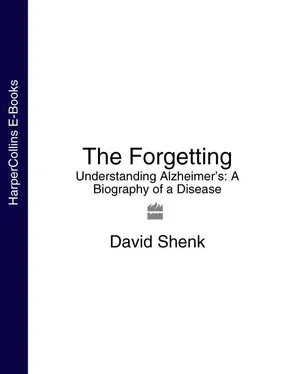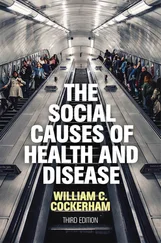I love you
You love me
We’re a happy family
Members of the early-stage group occasionally caught a glimpse of the middle-stage group as they passed by to get a cup of coffee. The quiet, desperate hope of everyone in this group was not to end up in the other group. Barring a scientific miracle, though, there would be no avoiding it. The average interval from diagnosis to death in Alzheimer’s disease is eight years.
In the meantime, there were a hundred small consolations. The early-stage group members had quickly come to rely on one another for help through this very strange ordeal. Sometimes barely able to remember from week to week, they had nevertheless become friends. They shared memories of movie stars and kosher butchers. They talked about travel and passed around pictures of grandchildren. They even talked politics.
“Greta, any comments on Giuliani?” Judy asked one afternoon.
Greta swatted an invisible bug away from her face. “Oh don’t get me started about him,” she said. “You know I can’t stand him.”
“Clinton, then? What does everyone think about Monica?”
Opinions ran the gamut. Ted, his hands shaking with a Parkinsonian tremor (it is not unusual for people to suffer from both Parkinson’s and Alzheimer’s), suggested that Clinton should resign because he lied directly to the American people. Greta, a lifelong subscriber to The Nation , thought that Clinton probably kissed Monica but that the whole issue was overblown. Sadie thought it was all a Republican scheme.
Doris had an opinion, too, but with her severe expressive aphasia—an inability to retrieve words—she had great difficulty making it known.
“Gore … President … I think … good leader … lies …”
She appeared to be aware of her thoughts and very clear on what she wanted to say. But the words were no longer accessible. This was especially painful to watch because, as everyone in the group knew by now, Doris had a forty-year-old son with cerebral palsy who was deaf The two were very close, and, as it happened, she was the only one in the family to have ever learned sign language. Now Doris’s aphasia was also wiping away that second and more vital language. She could no longer speak to her son, leaving him marooned.
It was now a few minutes after one o’clock, time to say good-bye for the week. Rides were arranged. Someone went to fetch William’s wife, a volunteer in the middle-stage group.
Robert seemed to be having a hard time of it. Just a moment before, he had been lucidly telling me about his family and his past. He’d had no problem relating how he was spirited out of Nazi Germany as a young boy, turned over to relatives in England and later in New York. I learned all about his children, their occupations and families, the cities they lived in. But now he was struggling to understand a piece of paper his wife had written out for him about getting home. To the undamaged brain, the instructions were fairly straightforward— Robert will be picked up by the car service at 1:15, and should be driven to his home at ___ Street .…—but he was having a lot of trouble making sense of it. Then there was the other problem. In the last half hour, he had told me how he eventually came to live in the Bronx, where he was introduced to his wife, a distant cousin. He had described how crowded that Bronx apartment was, and where else he had lived in the city as he’d grown older. But now, for the life of him, Robert could not remember where he had put his jacket.
It was on the back of his chair.
Very often I wander around looking for something which I know is very pertinent, but then after a while I forget about what it is I was looking for.… Once the idea is lost, everything is lost and I have nothing to do but wander around trying to figure out what it was that was so important earlier. You have to learn to be satisfied with what comes to you .
—C.S.H.
Harrisonburg, Virginia
Chapter 3 THE GOD WHO FORGOT AND THE MAN WHO COULD NOT
There could be no happiness, cheerfulness, hope, pride, immediacy, without forgetfulness. The person in whom this apparatus of suppression is damaged, so that it stops working, can be compared … to a dyspeptic; he cannot “cope” with anything .
—FRIEDRICH NIETZSCHE
As found in the Pyramid Texts , from 2800 B.C., Ra was the Sun God, the creator of the universe and of all other gods. From his own saliva came air and moisture. From his tears came humankind and the river Nile. He was all-powerful and, of course, immortal—but still not immune to the ravages of time: Ra, the supreme God, became old and senile. He began to lose his wits, and became easy prey for usurpers.
Throughout recorded history, human beings have been celebrating the powers of memory and lamenting its frailties. “Worse than any loss in body,” wrote the Roman poet Juvenal in the first century A.D., “is the failing mind which forgets the names of slaves, and cannot recognize the face of the old friend who dined with him last night, nor those of the children whom he has begotten and brought up.”
It took several thousand years, though, for anyone to figure out how memory actually worked. Plato was among the first to suggest a mechanism. His notion was of a literal impression made upon the mind. “Let us suppose,” he wrote, “that every man has in his mind a block of wax of various qualities, the gift of Memory, the mother of the Muses; and on this he receives the seal or stamp of those sensations and perceptions which he wishes to remember. That which he succeeds in stamping is remembered and known by him as long as the impression lasts; but that, of which the impression is rubbed out or imperfectly made, is forgotten, and not known.”
Later came the ventricular theory of cognition, from Galen (129 – ca. 199 A.D.), Nemesius (fourth century), and St. Augustine (354–430). According to this notion, the three major functions of the brain—sensation, movement, and memory—were governed from three large, round fluid-filled sacs. Vital Spirit, a mysterious substance that also contained the human soul, was harbor to the swirl of memories.
From this model came cerebral localization , the theory that the various functions of the brain were each controlled by specialized “modules.” This model of specialization turned out to be generally correct (if radically different in the details from what Galen had imagined). In the early twentieth century, it emerged that the brain wasn’t really an organ so much as a collection of organs, dozens of structures interacting with one another in dazzling complexity. Deep in the center of the brain the amygdala regulates fear while the pituitary coordinates adrenaline and other hormones. Visual stimulus is processed in the occipital lobe, toward the rear of the skull. Perception of texture is mediated by Area One of the parietal lobe near the top of the head, while, just to the rear, the adjacent Area Two differentiates between the size and shape of objects and the position of joints. The prefrontal cortex, snuggled just behind the forehead, spurs self-determination. Broca’s area, near the eyes, enables speech. Wernicke’s area, above the ears, facilitates the understanding of speech.
The more researchers discovered about localization, though, the more they wondered about the specialized zone for memory. Where was it? If vision was in the back of the brain, texture on top, and so on, what region or regions controlled the formation of lasting impressions and the retrieval of those impressions?
Part of the answer came in 1953, when a Harvard-trained neurosurgeon named William Beecher Scoville performed experimental surgery on a twenty-seven-year-old patient known as H.M. He had been suffering from violent epileptic seizures since childhood, and in a last-ditch effort to give him a chance at a normal life, Scoville removed a small collection of structures, including the hippocampus, from the interior portion of his brain’s two temporal lobes. The surgery was a great success in that it significantly reduced the severity of H.M.’s epilepsy. But it was also a catastrophe in that it eliminated his ability to lay down new memories. The case revolutionized the study of memory, revealing that the hippocampus is essential in consolidating immediate thoughts and impressions into longer-lasting memories (which are in turn stored elsewhere).
Читать дальше












